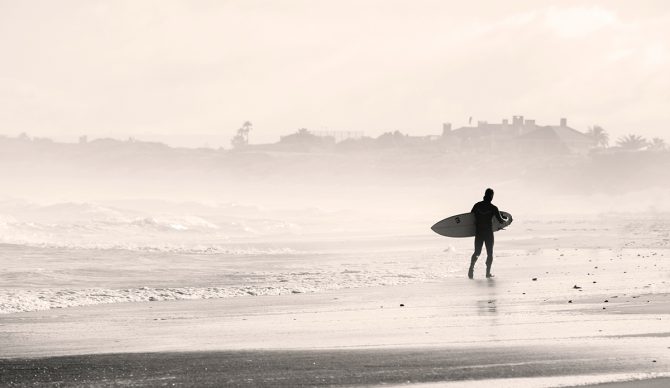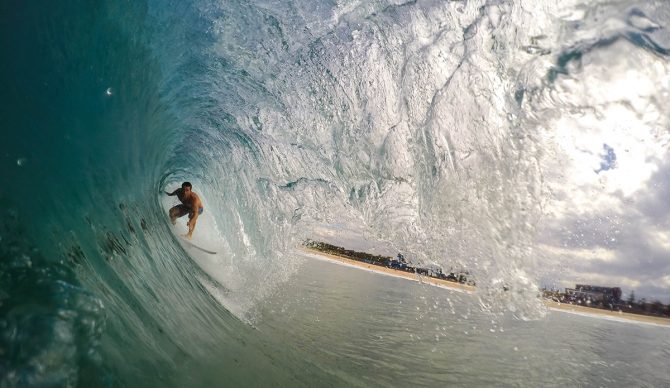
There’s not a lot to say when waves are all you think about. Photo: Shaun Bell//Unsplash
It’s funny to imagine social skills, as they pertain to surfing, mapped out on a chart. The X axis would represent time, maybe in years, and the Y axis would represent time spent talking. Not engaging in conversation, not listening, but talking. The line would, of course, look like a bell curve: the first time someone paddles out, they’re probably dead silent, observing those around them, trying to figure it out. As the learning continues and the surfer becomes more comfortable, they begin talking to other people in the water a little more, maybe even starting conversations and inquiring about the best windows to surf, the best places to paddle out, attempting to acquire knowledge of the area.
But then, interestingly, this desire to conversate drops off sharply, eventually leveling off to mouse-like levels of reservation as the surfer tunes in to the ocean and tunes out those around them. A quick nod in someone’s direction to demonstrate a respect for hierarchies, a head shake in the direction of a snake, a smile or “yew!” to someone in the green room on the way back out.
My theory here is that this occurs for two reasons: there are distinct, tangible benefits to staying quiet in the presence of others, but also, the desire to talk actually declines. The two are definitely correlated, but I couldn’t say for sure if they are causal. Surfing is a direct dance with nature. It is reactionary. It requires intense levels of focus and observation: of weather patterns, winds, tides, currents, surface textures… and the more tuned in one is to all of these signs, the better their surfing becomes.
Talking, on the other hand, provides certain knowledge: what kind of people are in the water (are they territorial? Are they on vacation or do they live nearby?), and usually some insight into their ability. However, in gaining this information, one has jeopardized their own time to watch for waves and be in the present. And this, then, negatively affects one’s performance, leading to poor sessions and a diminishing desire to trade waves for conversation, captivating as people may be. There’s a reason people stand around in the parking lot before and after their sessions to talk story!
Perhaps a bit of this is tied to localism, where there are strict rules surfers abide by. Staying low-pro is of the upmost importance so maybe, just maybe, someone more local might actually call you into a wave. Perhaps that’s why we don’t wear white wetsuits, ever. And generally, keep to ourselves. Hey, anything to seem cool, right?
The second theory here is that, because surfing is a physical activity often compared to meditation or yoga, there is value in quieting the mind and saying less. Talking takes away from some of the joy of being outside. It takes away from the moment. It interrupts the flow state. And, therefore, the desire to talk while in the water just doesn’t exist for many surfers.

Shhhh…. Photo: Jeremy Bishop//Unsplash
Like the philosophical theory of dualism, which imagines there are two substances that make up all of existence (body and mind). The experience of surfing, then, can be divided into those two. The mental aspect of surfing includes the thoughts one has while surfing, which can either be directed towards the physical act of surfing, or away from surfing and towards talking with other people. To have the most “pure” experience of surfing possible, surfers often paddle out alone, their minds occupied only by the present feelings of water and air, the study of the horizon and set lines, the constant scan for movement in the water.
This all extends even more so to the greats in surf culture. No matter who those are to you, and no matter what style of surfing you pursue, the best of the best share one important trait. They rarely talk themselves up. From the distinct surf legends of decades past to modern-day WSL pros, surfers just don’t seem to say much about themselves.
This is different than the mysto surfer phenomenon (or the idea that surfers often evade media attention to preserve their secret search for remote waves). This occurs in everyday life: when sitting next to another woman with a neck tan on the plane to Hawai’i, or when reading Allen Weisbecker’s recounting of his own surfing in the classic novel, In Search of Captain Zero.
It’s also important to note that the interactions between surfers versus the interactions between surfers and non-surfers are different, but both reserved. Surfers often don’t want to explain surfing to non-surfers. There’s not a lot to say. Between surfers, people often say less than necessary to let their wave-riding speak for them.
This can be explained by the psychological idea that skilled or powerful people would rather let their actions do the talking for them, instead of using words to boast about their achievements. In fact, Dan Lyons, author of the book STFU: The Power of Keeping Your Mouth Shut in an Endlessly Noisy World, claims that “most powerful and successful people talk less than other people, and they listen more. They speak with intention. And they understand the power of silence.” Lyons brings up household names such as Steve Jobs and Anna Wintour. Steve Jobs didn’t use social media much (he had zero followers on Twitter) and Anna Wintour is famously reserved.
And this certainly plays out when listening to The Surfer’s Journal “Soundings” episodes with Mason Ho (who hilariously recounts wipeouts with gusto and sound effects instead of bragging about how much he gets barreled, which he could easily do if he wanted to), Miki Dora’s iconic stubbornness to recount his experiences for the public or the press, or even this iconic interview with two lifesaving surfers from Australia.
The interviewer lays the compliments on thick, praising the heroic surfers, likely hoping for a crazy recounting of their experience, only to receive answers like “uhh, we were just watching the waves and uh… the woman just got sucked out.” Straight to the point and observation-based. Kind of like the skills used when surfing.
And, speaking of interviews, what a perfect encapsulation of the un-wordy parts of surf speak than the all-time favorite video of the “so pitted” Huntington Beach surfer dude. When explaining the conditions, a fully-suited surfer tells the interviewer: “You drop down, bahhh! Hit the lip… Wapow!” It’s funny, but at the end of the day, this guy’s on to something. Surfing really can’t be explained in words. It’s a special, unique, and highly personal experience. Silence often sums it up best.

